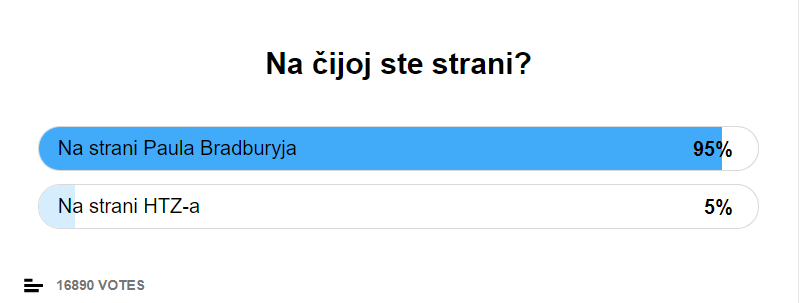Hodžić: Milanović Crossed the Red Line With Srebrenica Statement
ZAGREB, 5 Dec, 2021 - The chairman of the Bosniak ethnic minority council in Croatia, Armin Hodžić, said on Sunday that President Zoran Milanović's recent statement on the 1995 Srebrenica genocide crossed the line no one should cross.
"This kind of bargaining with genocide remembrance ... is unacceptable regardless of which side it comes from. Milanović has crossed the red line," Hodžić told a press conference in Zagreb.
Hodžić criticised Milanović for downplaying the scale of the genocide, committed by Bosnian Serb forces against Bosnian Muslims in the Srebrenica area of eastern Bosnia during the war in July 1995.
Hodžić said it was unacceptable that Milanović referred to the genocide as "a grave crime with elements of genocide", especially after international courts described it as an act of genocide.
Milanović downplayed the court judgments by saying that no court is the Holy Scripture, Hodžić said, wondering what sort of message that was to Croatian citizens.
Hodžić said that the most appalling part of Milanović's statement was that "not all victims are the same." Does that mean that Catholic or Muslim victims are more or less worthy than other victims? he wondered.
Hodžić recalled that 8,500 civilians had been killed in Srebrenica over a period of three days and that 1,200 were still unaccounted for. "There has been no such rhetoric in Croatia until now. It seems that we have entered a new dimension," he said, stressing that "no one, least of all people in high office such as the President of the Republic, should go below certain civilisational values."
Hodžić said that the continuity of Milanović's public statements showed his prejudice against Bosniaks. "That's a kind of organic primitivism. He regards Bosniaks as people who are only fit to work on building sites and make ćevapi (grilled minced-meat fingers). His view that the victims of the Srebrenica genocide are less worthy than the victims of some other genocides and war crimes is based on that kind of attitude."
He said that the purpose of such statements by Milanović was to win over Bosnian Serb leader Milorad Dodik "so that he would not stand in the way of amending the electoral law or achieving any other political goals in Bosnia and Herzegovina."
"Milanović is Dodik's closest pal today," Hodžić said.
Speaking of Croatia's policy towards Bosnia and Herzegovina, he said that it was "under the excessive influence" of Bosnian Croat politicians from Mostar.
For more on politics, follow TCN's dedicated page.
For more about Croatia, CLICK HERE.
Davis Cup Final: Croatia Tennis is 2nd Best in World
December 5, 2021 - Croatia is the second-best tennis team in the world after Russia celebrated in the Davis Cup final on Sunday in Madrid.
Russia celebrated the Davis Cup title after beating Croatia 2-0 in the final, winning both singles matches.
After Andrey Rublev defeated Borna Gojo 6:4, 7:6 (5) in the first match, bringing Russia the first point, Daniil Medvedev, the second-best tennis player in the world, defeated Marin Čilić 7:6 (7), 6:2, thus securing the Cup for Russia.
Čilić played an excellent first set but failed to hold his momentum in the second against this year's US Open winner.
In the first six games, both servers were efficient to reach a 3:3 score. In the seventh game, Čilić faced his first break point and ultimately missed a break point for 5:3.
The decision fell in the tie-break where Čilić led 4:2 but did not reach a single set point. Medvedev, on the other hand, used his third.
In the second set, Medvedev quickly reached a break and took a 3:1 lead which opened the door to victory. The Russian tennis player did not back down again and at 5:2 broke Čilić for the win and Russia's Davis Cup title.
Croatia had a brilliant Davis Cup campaign this year, beating Australia and Hungary in the group stage, before topping Italy in the quarters and Serbia in the semifinal for a spot in the final this year. Recall, Croatia played without one of its top tennis players in this tournament - Borna Ćorić.
Croatia thus remains on the two Davis Cup trophies. Croatia won the Cup in 2005 and 2018, and in addition to this final, they played and lost the final in 2016 (against Argentina in Zagreb).
This is the third Davis Cup trophy for Russia. They celebrated in 2002 and 2006. In addition to these victories, Russia has lost three finals (1994, 1995, and 2007).
DAVIS CUP FINAL:
RUSSIA - CROATIA 2-0
Medvedev - Čilić 7:6 (7), 6:2
Rublev - Gojo 6:4, 7:6 (5)
To read more about sport in Croatia, follow TCN’s dedicated page.
Francišković Remanded in Custody, Kovačević Released
ZAGREB, 5 Dec, 2021 - A Zagreb County Court investigating judge ordered on Saturday evening that Marko Francišković be remanded in custody on suspicion of public incitement to terrorism, while Natko Kovačević was released pending completion of the investigation.
Kovačević was ordered to report to a police station once a week.
The State Attorney's Office earlier demanded investigative custody for the two suspects after launching an investigation into their role in public incitement to terrorism at recent demonstrations against COVID passes.
Prosecutors claim that Francišković and Kovaćević," dissatisfied with the work of state authorities, acted with the aim of seriously undermining the fundamental constitutional, political, economic and social structures of the Republic of Croatia."
The suspects attended unlawful protest rallies where they spoke against measures undertaken by the national COVID-19 crisis management team to contain the spread of the COVID-19 pandemic and posted footage of those rallies and other statements on online platforms.
Prosecutors also say that the suspects called on citizens to physically attack other persons, including government and parliament officials, to occupy the HRT public broadcaster and other public facilities and infrastructure, and to use violence to overthrow the present constitutional order and democratically elected government.
For Croatia's latest news, CLICK HERE.
Croatia Logs 2,796 New Coronavirus Cases, 68 Deaths
ZAGREB, 5 Dec, 2021 - Croatia has registered 2,796 new coronavirus cases and 68 COVID-related deaths in the last 24 hours, the national coronavirus crisis management team reported on Sunday.
Currently, there are 29,478 active cases in the country. Among them are 2,381 people being treated for COVID-19 in hospitals, including 310 who are on ventilators. A total of 25,841 people are self-isolating.
Since 25 February 2020, when the first case was confirmed in Croatia, 631,037 people have been registered as having contracted the SARS-CoV-2 virus, of whom 11,218 have died and 590,341 have recovered, including 4,598 in the last 24 hours.
To date, 3,509,545 people have been tested for the new virus, including 8,277 in the last 24 hours.
As of 4 December, 4,245,741 vaccine doses have been administered, with 54.38 per cent of the total population, or 64.87 per cent of the adult population, having been vaccinated. A total of 2,206,995 persons have received at least one dose and 1,979,003 of them have been fully vaccinated, which is 58.40 per cent of the adult population.
For more on COVID-19, follow TCN's dedicated page.
For more about Croatia, CLICK HERE.
Diary of a Croatian Lawsuit: Substitute Lawyer Miraculously Appears!
December 5, 2021 - Round 5 of the Kingdom of Accidental Tourism v The Fat Blogger, and the most dramatic hearing so far.
I have to confess that I am really enjoying my ongoing lawsuits by the Croatian National Tourist Board. The longer the process goes on, the more absurd if becomes, and the blogging material is gold.
But last month's hearing was epic, taking things to the next level.
It was always going to be a surreal experience, as we all knew that we would gather for three pointless minutes, only to check our diaries to coordinate the next pointless hearing several months down the line, as the timeline of a typical Croatian lawsuit took shape.
Full disclosure, I arrived at the latest hearing on the back of a monumental trip promoting tourism in Slavonia, my body marinated in rakija after one of the best weeks of my 18 years in Croatia. Nothing about the previous week had been normal, and so an appearance in a Croatian court was a natural next step.
To recap.
I am facing two lawsuits from the Croatian National Tourist Board:
1. For an article that I didn't write, on a portal that I don't own, in which I was quoted. Neither the journalist nor the portal was sued. There was no request for a retraction. The article is still live, and you can enjoy it here. I was sued for defamation for 50,000 kuna.
2. For three days last year, my private Facebook cover photo featured an amended Croatian National Tourist Board logo - from Croatia, Full of Life to Croatia, Full of Uhljebs. Another lawsuit for 50,000 kuna.
The logo attracted 316 likes at the time, 20 comments, and 9 shares. After 3 days it was forgotten. Until...
Once the lawsuits became public, the story was EVERYWHERE. I was on the evening national news, national breakfast television, and Index even did a poll that attracted almost 17,000 votes.
One portal described the lawsuit as 'the greatest PR own goal in the history of the Croatian National Tourist Board.'
I couldn't possibly comment on that, but it has been fascinating to see how this lawsuit continues to keep alive a piece of satire that would otherwise have been long forgotten after a brief appearance on social media.
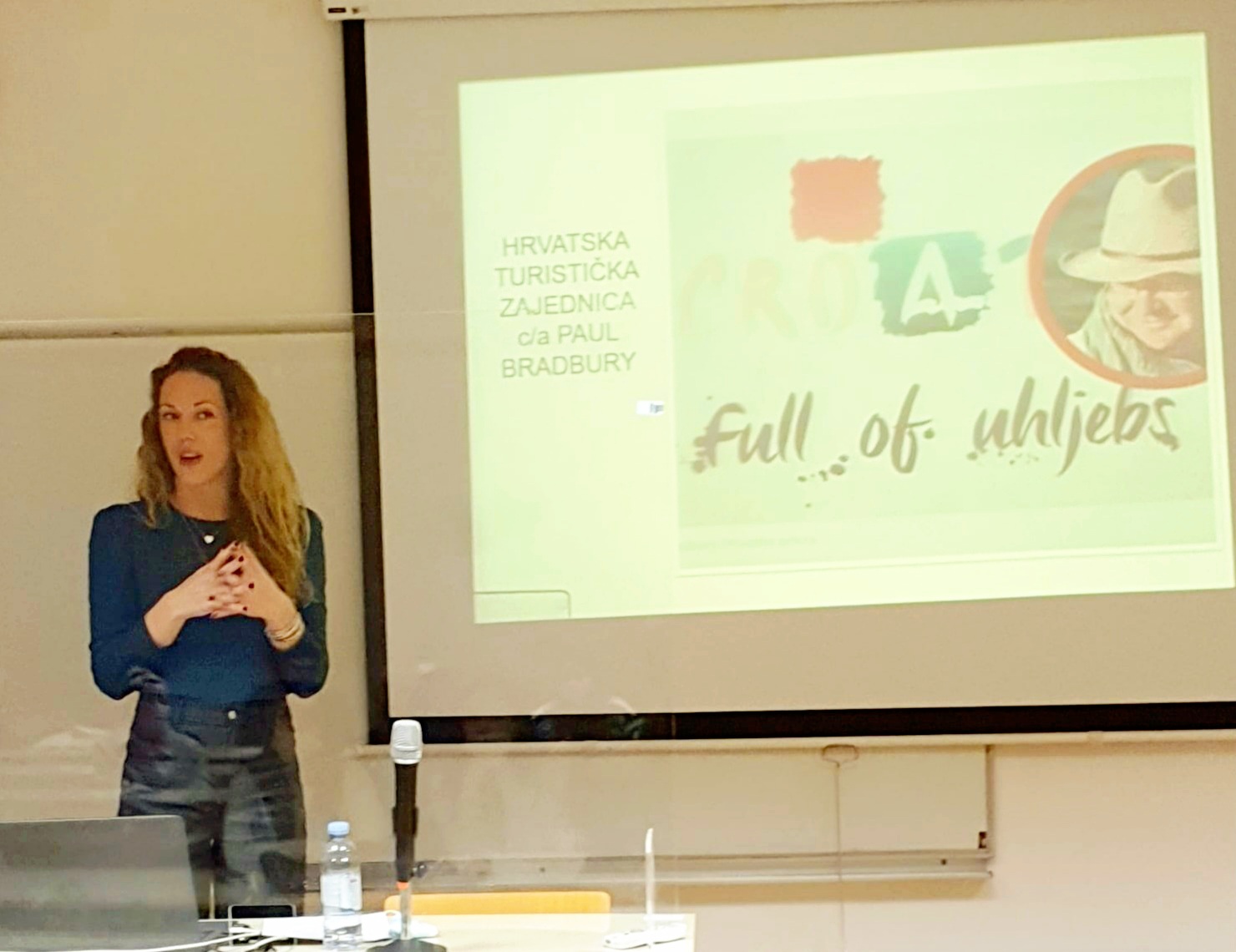
Croatia, Full of Uhljebs entered the world of academia this week, as Legendica Extraordinaire, my fabulous lawyer Vanja Juric, used it as a case study in her guest lecture at the Faculty of Political Science at the University of Zagreb, while talking about the joys of representing journalists, publishers, and fat bloggers.
I would be lost without her.
But I digress. To last month's court hearing, which was not about the logo, but about the article that I didn't write on the portal that I don't own.
I would like to establish the timeline.
June 12, 2020 - Index.hr published the offending article - Fiasco: We brag that we are a corona-free zone, but foreign tourists have no idea about it.
August 2020 - A lawsuit is stamped by the court
October 2020 - The lawsuit is delivered to my address. I panic. Even more so when a second lawsuit appears two weeks later.
October 2020 - I meet Croatia's leading media lawyer, Vanja Juric. I immediately stop panicking.
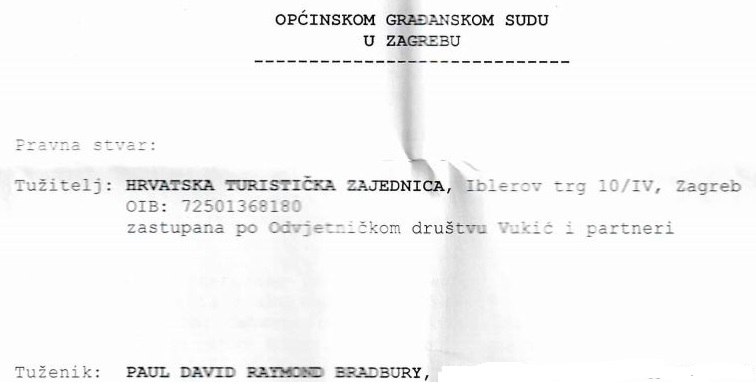
April 3, 2021 - I change my Facebook cover photo to inform people I am being sued. I am genuinely humbled at the outrage and hundreds of messages of support and offers of financial assistance.
May 3, 2021 - The first hearing of the lawsuit for the article I didn't write on the portal I don't own is delayed until May 31. The lawyer for the prosecution has double-booked his time apparently. Despite the fact that there are 50 lawyers in the law firm, nobody else can represent the plaintiff in this most complicated of cases. Their lawyer calls Vanja to reschedule (I am sure the timing of the hearing, less than 2 weeks from national local elections, played no part). We have no reason to delay, having done nothing wrong, and politely decline. The court then informs us that the hearing will be delayed until May 31.
May 26, 2021 - I learn that it is possible to film proceedings if I apply to the court for permission more than 48 hours in advance. Within an hour of my email, I receive a reply from the court that this it is not possible, as the hearing has been delayed to November 22. Vanja receives an email at the same time, which informs her that the plaintiff's lawyer has double-booked again. Vanja calls the judge to register her displeasure that this has now happened twice. The judge was unaware that this was the second time he had double-booked and stated that it would not happen again.
November 2021 - I apply to film the November 22 hearing, but am again denied. It is not in the public interest (I would argue that the Index poll would make it so), and there are the epidemiological measures to consider (I am not quite sure how taking my mobile out of my pocket is going to spread COVID-19, but the decision is final).
November 22, 2021 - We are rather surprised to arrive at the court to find another lawyer waiting to represent the Croatian National Tourist Board. The original lawyer, who seemingly is the only one qualified to handle such a complicated case, is stuck in traffic. With no option to delay the hearing due to the judge's decision after the last postponement, he miraculously found a colleague who was free and available to take his place at very short notice. Quite extraordinary, given that this was not possible with weeks of notice with the previous two postponed hearings.
!We begin, and then after 10 minutes, in walks the original lawyer, pulling his suitcase behind him, as though he was entering a bar after getting back from holiday.
Vanja suggested that we end this farce without wasting everyone's time further. She pointed out that the plaintiff would need to prove that I had done something against the law. As I had merely stated a value judgment about the work of a public institution, this cannot be deemed as against the law. The prosecution would also need to prove the act of causing damage, the causal link between the act and damages, and to prove that any damages justified the financial damages sought. As this was clearly impossible to do, it made no sense to continue.
The judge said that she had to listen to the witnesses from both sides, so we went into our calendars, and agreed to meet again (assuming no double bookings or traffic jams) on May 5, 2022, just over a year since the first hearing postponement, and almost two years since the article appeared online.
And then something interesting.
Actually two things.
The first was that Croatian National Tourist Board's lawyer said that they were open to an apology. This was excellent news. I, too, am open to an apology. If they would like to apologise to me, pay for my costs, and treat legendica Vanja and her family to a weekend on the coast as a compensation for her time, I would be happy to move on.
The second thing was very interesting... and a little disappointing. When we meet again in May next year, both sides will be producing witnesses which have already been identified. One of the two for the plaintiff was the Director of the Croatian National Tourist Board, Kristjan Stanicic, a man I have never met. It seemed that we were destined to finally meet at the next court hearing. But in an unexplained move, the plaintiff's lawyer has removed Director Stanicic from the list of witnesses, and replaced him with the Head of Global PR for the Croatian National Tourist Board.
I do wonder if we will ever meet.
What does all this mean? Who knows, but to be continued...
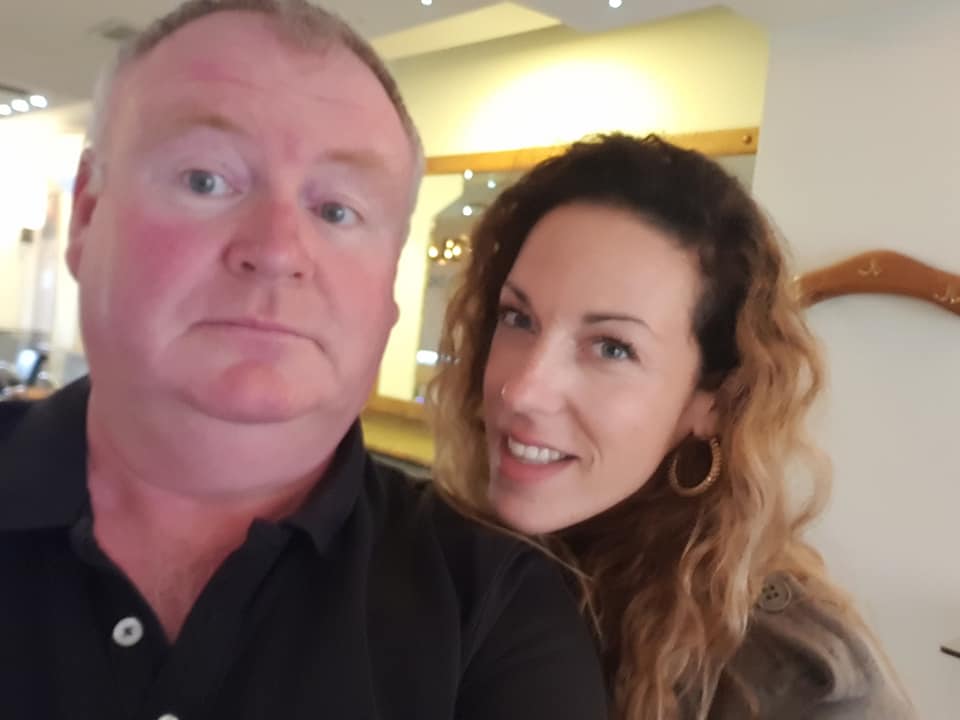
See you in January, 2022 for the next installment - the latest hearing in the Croatia, Full of Uhljebs case, and my next eagerly anticipated coffee with legendica Vanja.
You can follow the latest from Diary of a Croatian Lawsuit here.
Interactive Croatian Vaccination Map Reveals Jabs by Region, County, and Municipality
December 5, 2021 - The Croatian Institute of Public Health has published an interactive Croatian vaccination map concerning the total population of Croatia according to the place of residence.
Dark red shades are parts of Croatia with a lower percentage of vaccination (up to 19%). In comparison, parts with slightly higher vaccination are marked shades of orange and light orange (up to 29 and 39%), followed by yellow and light yellow (up to 49 and 59%), reports Jutarnji List.
Thus, the map shows that the coastal part of Croatia is less vaccinated than the continental areas. Among the counties, Varaždin is the most vaccinated (47.33% vaccinated with the second dose), and Split-Dalmatia is the least vaccinated (33% with the second dose).
The map also shows the vaccination rate of municipalities.
Only the municipality of Sali in Zadar County is green on the map of those vaccinated with the second dose, which means that it has vaccinated over 60% of the population, in their case, 65.47% of people.
The weakest vaccination rates are in Vrhovine in Lika (17.92%), in Bjelovar-Bilogora County - in Zrinski Topolovac (18.47%), and Đulovac (19.03%) as well as in Split-Dalmatia County in Dicmo (19.15%), and Otok (18.67%).
As for the four largest cities, the best is Rijeka (47.85 %) and Osijek (47.65%). Zagreb is at 44.59% and Split at 35.5%.
You can see the map HERE.
On Saturday, December 4, 4,465 cases were reported positive, whereas another 54 COVID patients died, bringing the COVID-related death toll to 11,150. In addition, 11,717 coronavirus tests were conducted.
There are 31,348 active cases in Croatia 2,382 are receiving hospital treatment, including 317 patients on ventilators.
Since the first registered case of infection on February 25, 2020, 628,241 people have been infected, and 585,743 of them have recovered, including 4,712 on Saturday.
Over 4.2 million vaccine doses against coronavirus have been administered in Croatia. So far, 54.29% of the total population have got at least a jab or nearly 65% of adults.
Furthermore, 58.13% of adults have been fully vaccinated.
For more on COVID-19, follow TCN's dedicated page.
For more about Croatia, CLICK HERE.
2021 Split Gastroadvent Lights Up Dvor with Prosciutto Creations by Chef Hrvoje Zirojević
December 5, 2021 - The second Split Gastroadvent candle was lit on Sunday by portal journalists and representatives of Split-Dalmatia County. The event is traditionally organized by famous dietician and nutritionist Olja Martinić. This Sunday's Advent candle was lit for peace and love, with prosciutto creations by famed chef Hrvoje Zirojević.
Gastroadvent is a unique event that has promoted the Mediterranean diet for decades through a fusion of nutrition, gastronomy, and tourism. Thanks to the engagement and participation of dedicated journalists, who continue to bring light to Split, the event persistently shares scientific knowledge woven into gastronomic skills, the numerous health benefits of the Mediterranean diet, and the preparation of dishes from unique ingredients.
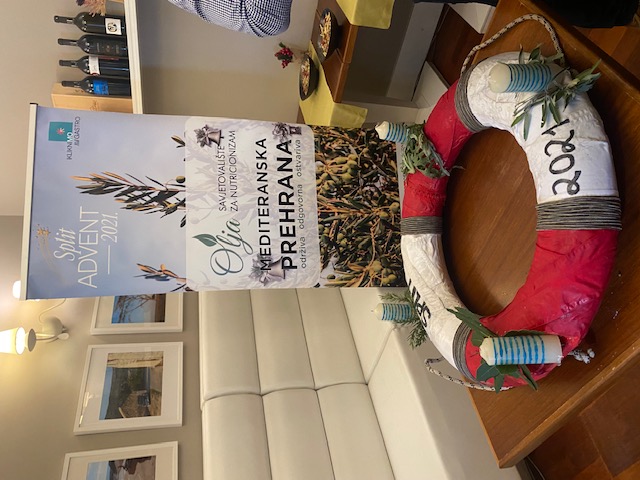
The theme of this year's Gastroadvent is "Mediterranean nutrition is sustainable, achievable, and responsible." In its original form, the stated principle is the basis of action and, as such, should remain the foundation of behavior. The Mediterranean Sea connects all the countries founded on the Mediterranean diet. For the Mediterranean diet to be sustainable, we must responsibly dispose of our waste and use resources rationally.
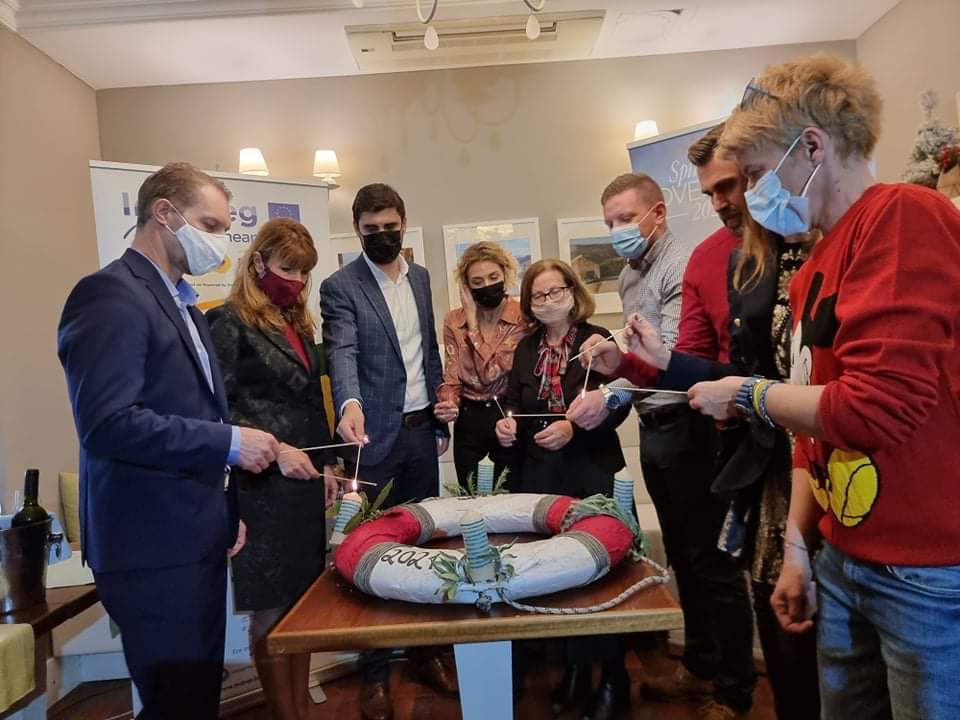
The most delicious prosciutto is produced in the Mediterranean region. Resources are used rationally, especially the sea and the bura wind, to obtain a dried ham product. The first recorded mention of prosciutto dates back to 100 BC and is preserved in the Italian city of Parma. And they, just like us, have kept the tradition of producing prosciutto all these years.
But this is more than just a 2,000-year-long tradition. In addition to gastronomic quality, it is important to know the nutritional facts of prosciutto.
Namely, 100 g of prosciutto contains:
Calories: 280 kcal
Carbohydrates: 0.3 g
Fat: 18.3 g
Protein: 25.9 g
Vitamins
Vitamin B1 (thiamine) - 82% RDA
Vitamin B2 (riboflavin) - 16% RDA
Vitamin B3 (Niacin) - 37% RDA
Vitamin B6 (pyridoxine) - 81% RDA
Vitamin B12 (cobalamin) - 27% RDA
Vitamin B9 (folate) - 6% RDA
Vitamin E (tocopherol) - 2% RDA
Minerals
Calcium - 1% RDA
Copper - 3% RDA
Iron - 6% RDA
Magnesium - 5% RDA
Manganese - 1% RDA
Potassium - 27% RDA
Phosphorus - 26% RDA
Selenium - 20% RDA
Zinc - 23% RDA
Prosciutto is relatively rich in nutrients, and their relationship is synergistic. It is essential to emphasize that prosciutto and pork products primarily contain oleic acid, which is necessary for all those who take care of quality fatty acids. We can rightly say that prosciutto and related products, in the diversity of the Mediterranean diet, have guaranteed the sustainability of health for generations.
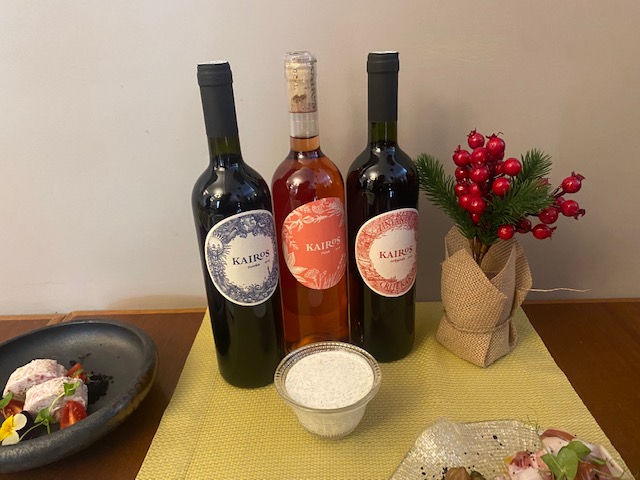
The sumptuous gastronomic table with dishes, prepared and served following current epidemiological measures, was the work of Caffe-restaurant Dvor under the baton of a distinguished chef, Hrvoje Zirojević, paired with Pošip and Crljenak wines from Kairos winery.
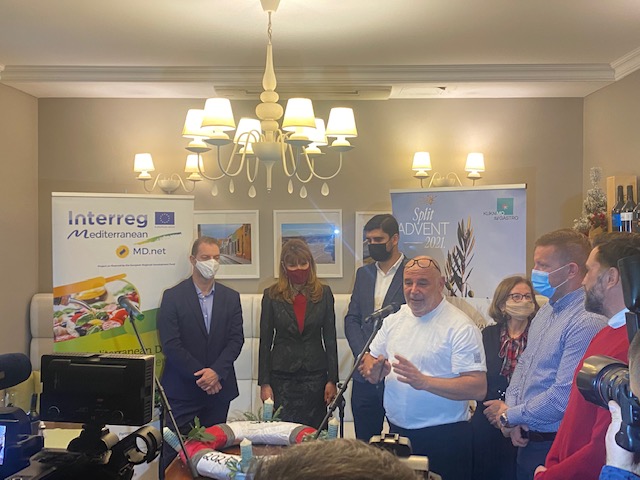
This Sunday's menu included goose liver wrapped in prosciutto with brioche, prosciutto pesto, prosciutto and bacon with pickled vegetables and herbs, prosciutto and sauerkraut strudel, white cod with bacon chips, cod stew with bean paste and prosciutto pesto, saltimbocca, pljukanci with prosciutto, truffles, and mushrooms, and cream of pumpkin soup with prosciutto chips.
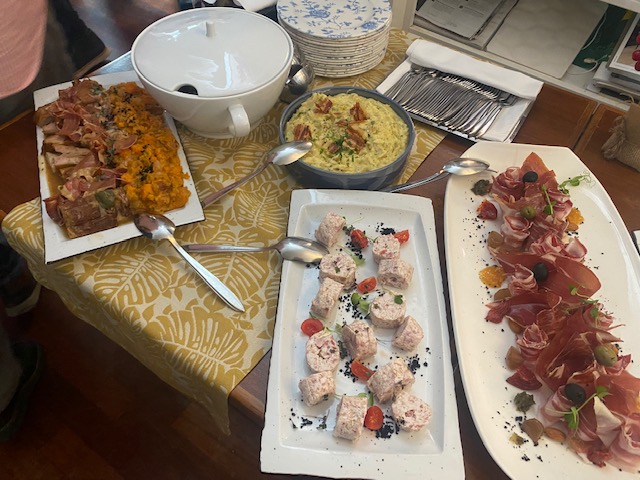
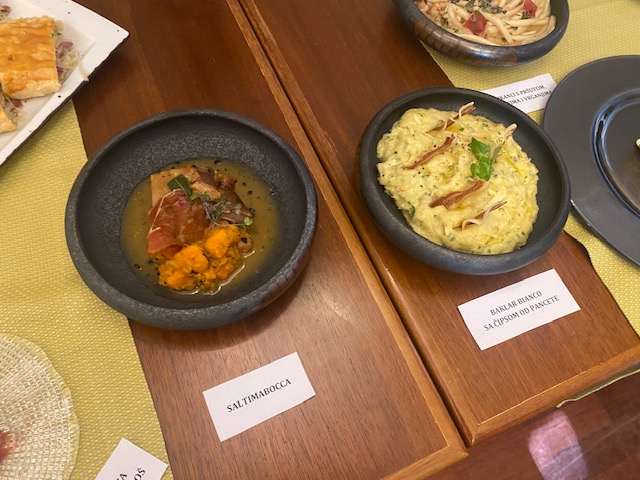
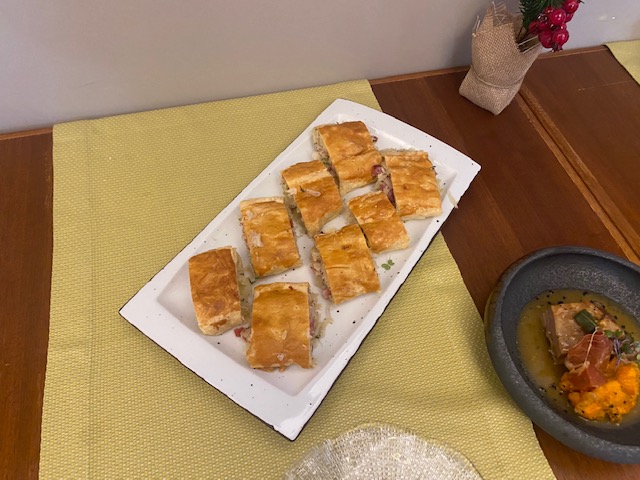
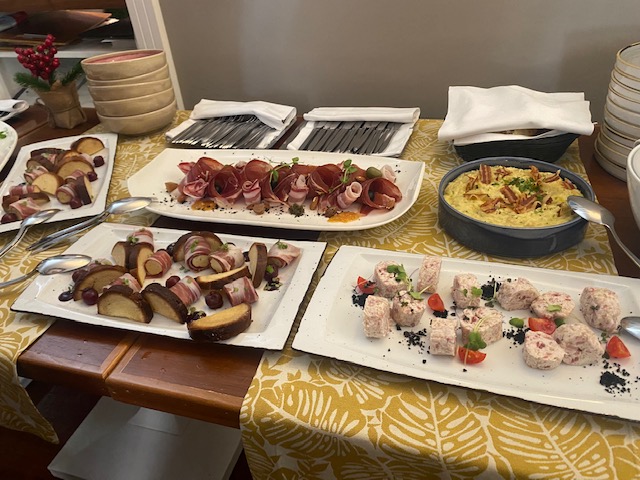
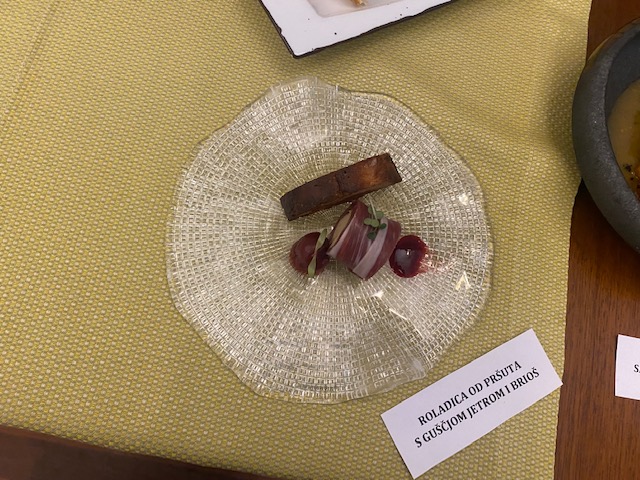
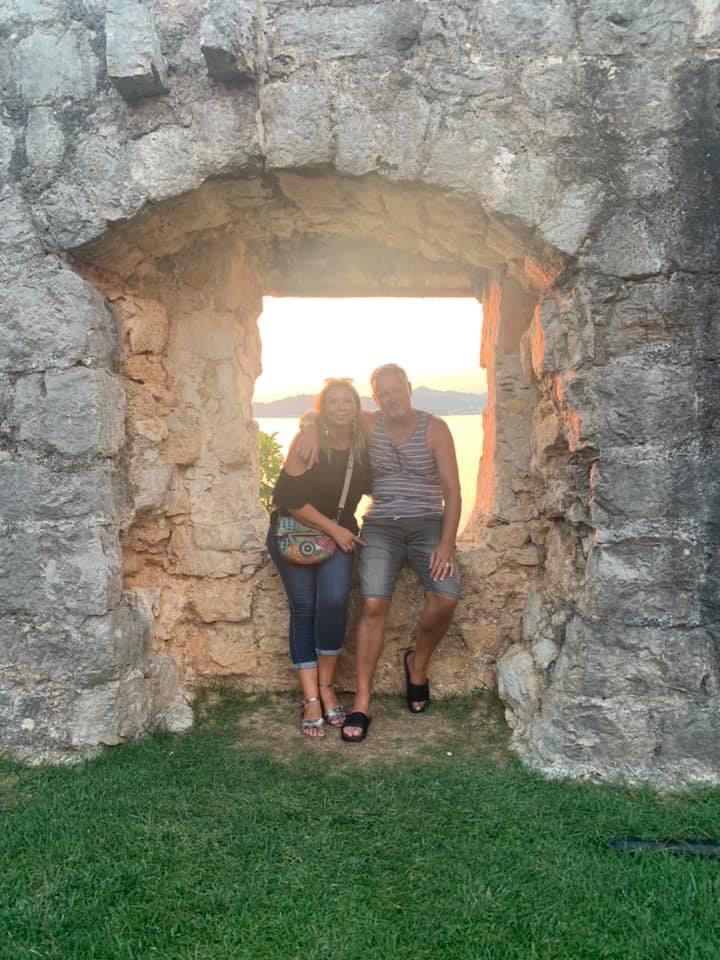
Split-Dalmatia County and the Split-Dalmatia County Tourist Board are avid supporters of Gastroadvent in Split, thus promoting the Mediterranean diet and local producers, entrepreneurs, and tourism workers.
The Split Tourist Board has worked hard to position the destination, harnessing a natural combination of history, gastronomy, and modernity, all to protect the components of the Mediterranean diet. The City of Split is determined to support projects that benefit its residents and demands guests after authentic experiences and new technological opportunities.
The Croatian Chamber of Commerce has advocated for years to encourage the representation of domestic products, and since 1997 has implemented the national project "Let's Buy Croatian." The project aims to increase the consumption of local products and thus support the economy. This project is of particular importance, emphasized by the director Joze Tomaš, and confirmed by the cooperation with Gastroadvent.
JU RERA S.D., as part of the MD.net project to establish innovative food products, has cooperated with primary and secondary schools in Split-Dalmatia County and stakeholders involved in producing or marketing Mediterranean food products and promoting the Mediterranean way of life. The MD.net project focuses on development opportunities and problem-solving related to popularizing the Mediterranean diet. The Mediterranean diet is a part of the Mediterranean identity inscribed in the UNESCO list of intangible cultural heritage. The project aims to strengthen research in this area following the UNESCO Convention on Mediterranean Nutrition, raise the quality of nutrition and life in 9 project partner countries, and promote the Mediterranean diet, which is recognized as the gold standard of proper nutrition with far-reaching health benefits.
Apart from the desire to involve as many people as possible and bring them closer to the importance of the Mediterranean diet in everyday life, as well as its impact on their health, the other goal of the project is to establish a standard in the Med Diet Declaration logo to classify Mediterranean areas. The ultimate goal of awarding the Declaration is to position Split-Dalmatia County as a desirable Mediterranean culinary region.
Special partners of this year's Gastroadvent are Scala d.o.o. and Kairos winery. The "Mediterranean Food 2021" event host is Scala d.o.o. from Split in cooperation with the Olja Nutrition Counseling Center.
The designer of this year's Gastroadvent wreath is artist Tonka Alujević, who depicted the Advent wreath from a lifebuoy as "a maritime object that serves to save a man who, for various reasons, is helpless in the sea and is in mortal danger." And that is precisely the health and political position we are in at the moment.
Split Gastroadvent is held every Advent Sunday at a new location, honoring a different group of journalists with new culinary creations at each event.
To read more about lifestyle in Croatia, follow TCN's dedicated page.
Croatian Staff Could Benefit Greatly From Valamar Austrian Hotel Purchase
December the 5th, 2021 - Valamar's purchase of an Austrian hotel could be fantastic not only for those who are investing in Croatian tourism but also for Croatian staff who want something much more permanent than seasonal work over summer.
As Poslovni Dnevnik/Marija Crnjak writes, a Valamar Austrian hotel, a new one that is, could finally iron out the issues faced by temporary employment and the extremely seasonal nature of the Croatian economy, making things far more stable for Croatian staff who crave a regular income without worries.
Such an exchange, however, can hardly be expected at an institutional, interstate level, either because of legal barriers or the fear of hoteliers that they will lose workers who will simply drop everything without a second thought for a better salary in a ski-oriented, higher paying country.
In such circumstances, it is difficult to expect employers to seek formal education when hiring, which is advocated by professors from the Croatian education system, especially because students are educated according to outdated and inappropriate curricula. That could change once the Regional Centres for Competences in Vocational Education come to life, and the first effects on the labour market should be seen in around 2028. All of this could be heard at a panel discussion held at Zagreb's Faculty of Economics on Thursday.
The discussion on the connection between education and the labour market with as many as 10 panelists was organised by Zabok High School and the Faculty of Economics within the ESF project Zabok Regional Centre.
As many as three large tourist companies operating here in Croatia have facilities in their portfolio at Austrian ski resorts, and they're all fresh acquisitions. The Falkensteiner Group opened the Hotel Kronplatz in South Tyrol last year, this September it was announced that the Arena Hospitality Group is buying the Franz Ferdinand Mountain Resort hotel in Nassfeld. Valamar Riviera is currently buying its second hotel in Obertauern, and the plan is to employ more than 130 Valamar employees from Croatia during the winter at the ski resort.
"At Valamar, the focus is on permanent employment, we also have over 1,000 permanent seasonal workers, and the strategy of the internationalisation of our business in winter destinations has fitted in perfectly with these efforts. This gives Croatian staff the opportunity to continue working in this market, which has higher salaries, after the summer season, as their income in hotels in Obertauern is in line with Austrian law. In addition to the financial opportunity, they get a chance to expand their knowledge and experience, as well as improve their knowledge of the German language, which is important.
At the same time, they're sure that they will be accompanied there by the heads of departments they already know from Croatia, and they're also sure that they will have a job on the Adriatic by the time spring rolls around. This is also our attempt to address the problem of the emigration of Croatian staff abroad in this way,'' said Ines Damjanic Sturman, the director of the Human Resources Department at Valamar.
Although this is being considered, the institution of exchanging employees between countries with higher needs in the summer or winter season will be difficult to implement, said Sonja Holocher-Ertl, the director of Advantage Austria, a branch of the Austrian Chamber of Commerce's foreign trade department. On the Advantage Austria website, about 40 travel companies are currently looking for workers from Croatia.
“Hotel owners in Austria have similar problems when it comes to finding workers as Croats do. The most basic occupations are in demand, waiters, chefs, receptionists, housekeepers, janitors... and most employers are small or medium-sized family businesses, owners of 4 or 5 star facilities. This winter season, a desirable criterion is that workers be fully vaccinated against the novel coronavirus. Exchanging workers is an attractive idea, but it can best be done if someone happens to be the owner of said facility, who then relocates his workers as he wishes.
Without that, the matter can easily become very complicated, either because of legal procedures or because of the fear of employers that workers will simply stay where the conditions are better, in Switzerland, for example, Croatian staff are paid significantly more than they'd ever be in Croatia,'' explained Holocher-Ertl.
When it comes to labor migration, Natasa Kacar, director of the employment agency Gate2Solutions, claims that there are a lot of Croatian citizens who do, despite all, want to return to Croatia eventually.
"A lot of workers who work abroad call us because they're looking for jobs in tourism back home in Croatia, but they want decent wages and off-season work as well, and they want to know what conditions their would-be employers offer, and it's very difficult for us to find employers who can offer them what they need,'' concluded Kacar.
For more, check out our dedicated business section.
Sustainable Croatian Tourism: Valamar Announces New Investment Cycle
December the 5th, 2021 - Sustainable Croatian tourism is a goal that the vast majority of actors in this most important economic branch are busy aiming for as mass tourism continues to bring as many issues as it does kuna into the country. Valamar is making concrete moves in this direction.
As Poslovni Dnevnik writes, following on from the finalisation of the second phase of the capital increase in Imperial Riviera worth a massive 690 million kuna, the Supervisory Boards of the Valamar Group companies approved the transfer of three hotels down in Dubrovnik from Valamar Riviera to Imperial Riviera, a joint venture for Valamar and Allianz ZB for the management of mandatory and voluntary pension funds.
This capital increase and the transfer of the hotel to Imperial aims to accelerate significant investments in the reconstruction and further construction of resorts in the destinations of Dubrovnik, Makarska and Rab, for which Imperial has planned 2.1 billion kuna over a five-year period. Soon enough, the Valamar Group will launch investments totaling 500 million kuna in hotel and tourist facilities and facilities managed by Valamar.
Sustainable Croatian tourism, more precisely ''green'' tourism, and digital transformation, as well as investments in the premium segment, will form the backbone of the development of Valamar's portfolio in the coming period. In order to implement investments and transform their business, the management of the Valamar Group will be reorganised, for which the top management was given a mandate until 2026.
President of the Management Board Zeljko Kukurin and member of the Management Board Marko Cizmek have been reappointed for a new five-year term, while former Vice President Ivana Budin Arhanic has been appointed to the Valamar Riviera Management Board with a focus on further internationalisation, sustainable Croatian tourism and business digitalisation.
Alen Benkovic has been appointed President of the Management Board of Imperial, and is set to become Senior Vice President of the Valamar Investment Group. Davor Brenko has been appointed Senior Vice President of the Valamar Sales and Marketing Group with a focus on product development and increasing direct sales. David Poropat will take over the position of Senior Vice President of Operations with a focus on strategic partnerships and service management.
Sebastian Palma has been appointed to a new term as a member of the Board of Finance for Imperial Riviera and becomes Vice President of the Strategic Controlling Group. Ines Damjanic Sturman has been appointed Vice President for Human Resources Development as a strategic function in Valamar's business, and Tomislav Dumancic is becoming Vice President for Dubrovnik and Dalmatia, where significant investments are planned in the coming period. Vlado Mis, the current President of the Management Board of Imperial Riviera, will become an Advisor to the Management Board and Director of the destination of Rab.
Croatian sustainable tourism is something that will allow the country to escape from the binds of the classic ''three months of sea and sunshine'' that it has been embedded in ever since tourism took off here following independence. Given that this little country has so much to offer and diversity like few others, making this move could place it firmly on the year-round tourism map and allow for a far more stable economy.
For more, check out our dedicated business section.
Two Charming Model Jadrolinija Ferries Sail into Slovenian Lake Near Kranj
December the 5th, 2021 - Two Jadrolinija ferries have ventured outside of the realms of the Croatian Adriatic sea to no less than a Slovenian lake located close to Kranj. But how?
As Jurica Gaspar/Morski writes, Krcanka and Kacjak are two Jadrolinija ferries from the wider fleet that sailed on a Slovenian lake in a small village near Kranj. How did they manage that, you might ask? Well, very simply, these models of real Jadrolinija ferries have been lovingly made by Klemen Peric and so far he has made three of them.
Kacjak was made back in March this year, and it took Klemen eight months to make it. The original ferry was built in Uljanik back in 1952 as a landing ship for the then Yugoslav Navy, and from 1963 until 1971 it was a Jadroinija ferry, after which, it ended its days in the Viktor Lenac shipyard. Krcanka had otherwise been in Jadrolinija's fleet since 1970, and at the end of 2015, it ''retired'' from function in Kraljevica.
All of Peric's ferries sail independently, they can dock at a port, which he also made especially for them, and they even raise and lower their ramps.
''I have three sailing ferries in my fleet so far. The first was Sveti Marin, then Krcanka. They were built around 2005, and I'm working on the details on Krcanka right now. Saint Marin is still waiting for details to be made. And as for Kacjak, you know I built it this year, the first voyage was in the spring, then everything stopped with the details, because I didn't get anything concrete from Jadrolinija. Then the son of the captain of the real ship, Mateo Rudan, called me himself. His father Jerry was the commander on the Kacjak and only they helped me with some old paintings, in addition to what I already had from my own photographs. After that, I made a model, because everything works like it would on a real ship,'' Peric explained.
He went into so much detail with these Jadrolinija ferries that he adapted small buses that could also board the ferries that would take them to the other side of the lake.
''Both of the two ramps on Kacjak can be lowered and raised with two servomotors and each ramp has its own power steering system, but they of course needed to be modified. To imitate the smoke, I bought a small "smoke generator", which runs on paraffin oil and 7.4V. It also has all the lamps like a real ship and everything runs on command. The bus is also remote, it's just a cheap toy, just enough to make the ferry boarding as realistic as possible. And I decorated it a bit, I painted it in the colour of Alpetour, because my late dad drove a similar coloured bus when he worked for this company,'' Klemen Peric added.
He received inquiries for the sale of these Jadrolinija ferries, some even said that the price is not a problem, but Klemen doesn't sell them.
''Yes, many people sent me messages about where to buy them or if I could make such a model for them, but I only do this for me, because this is a hobby I have only for myself and I work on it when I have some time,'' concluded the talented Peric.
For more, check out Made in Croatia.


